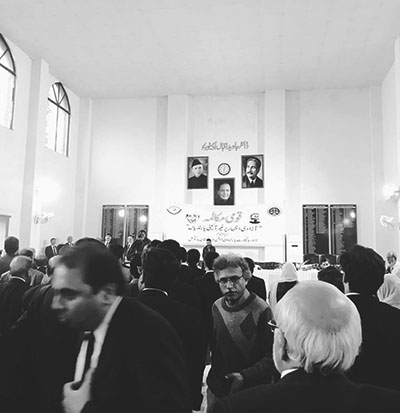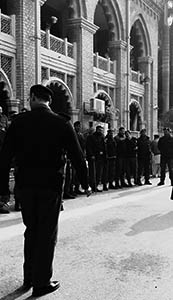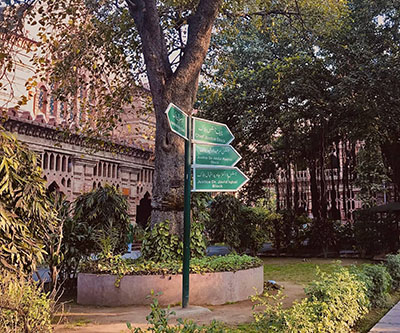Editor’s note: This post is the third in our five-part series “COVID-19: Views from the Field.” Click here to read an introduction written by series organizer Rebekah Ciribassi.
Since the start of the Coronavirus induced lockdowns in Pakistan in mid-March, I have had to cut short my ethnographic field-work in the country’s Anti-Terrorism Courts, and shelter in place in my family’s home in Lahore indefinitely, as Australia’s borders also closed to temporary visa holders. Yet long before the world fell apart, I had come to realize that as a brown, Muslim woman with a Pakistani passport (who also happened to be studying Pakistan), every stage of the PhD/academic life was doubly arduous. From acquiring a visa to get to Australia where my university is based while dealing with my family’s disapproval; applying for, getting visas and traveling to international conferences, to getting research ethics and fieldwork travel approvals, every little milestone required many times the effort that my peers had to put in.
The outbreak of Covid-19 has made everything that much harder, and excruciatingly disjointed: while the world outside appears to be running on fast forward, gauged from the density and urgency of news and data being thrown at us from all directions, it feels like my own life, and field-work, have been suspended mid-air: on pause until further notice. It is likely that international travel for “non-citizens” of Australia will not be possible until next year, so returning to my life in Sydney, where things seem to be moving towards some form of “normalcy” (albeit with massive job losses and increased precarity) is out of the question. Meanwhile Pakistan’s cases are rising steeply (the current figure stands at over 15,000 confirmed cases with over 300 deaths) and the government is struggling to weigh a few bad options (lift the lockdown and let people die of the virus, or extend it and let people die of starvation/pave the way for massive civil unrest). Given this context, the kind and extent of fieldwork that is going to be both possible and sensible, remains a huge question mark.
Like many commentators have pointed out, this pandemic exposes the fault lines of capitalism and the fallouts of decades of neoliberal policies, austerity measures and privatization – with the precision of an x-ray. This holds true for Pakistan as well, where the State made many a pact with the devil, including IMF led structural readjustment programs from the late 1980s, prescribing trade liberalization, cuts on government spending and subsidies, reduction of budget deficits etc[1], which led to poverty skyrocketing. But in Pakistan’s case, this trend is compounded by the fact that a large chunk of the GDP is eaten up by the military and security related functions[2], leaving little for public goods like healthcare.
The effects of a public health emergency like COVID-19 on top of that, are bound to be devastating. Yet these effects are differently distributed across the population, and are inflected by class, gender, geography, and professional affiliation among other things. While the middle and upper classes shelter at home comfortably, the urban poor deal with increased police harassment and evictions from their informal settlements on state land. Workers who had jobs are let go, manual laborers who worked for daily wages, scour the city for rations to feed their families. Women deal with domestic violence with nowhere to escape, as public shelters are deemed non-essential and closed down. Under-trial and political prisoners are made to risk their lives in over-crowded prisons with confirmed outbreaks of the virus, as the Supreme Court refuses to grant them bail. While men in uniform garner all the praise as front-liners, the nation’s young doctors are beaten by the police for protesting the lack of personal protection equipment, and reprimanded for filing a petition with the Lahore High Court on the issue. And these are all accounts from major urban centers: what of the margins of the nation-state, areas where war, militancy, and militarization have wrecked havoc for decades on end? What new horrors will the virus, and it’s afterlives, bring to people who live there?
Do Not Travel: On Assigning Risk
Research, and the sites of our research, can be politically contested, sometimes even before we set foot in the field. The process of getting my research ethics approval was a lesson in this: the words Pakistan, terrorism, courts, ethnography, when strung together in the same sentence, set alarm bells ringing for the ethics committee. The hoops I had to jump through did not just end at the 6 page long and 44 question strong response I received on my ethics application; I also had to fight tooth and nail with my university’s Risk Assessment department to get a travel approval to even go to Pakistan on university business. All of Pakistan was considered risky and most of my proposed research sites fell under the Australian Department of Foreign Affairs and Trade’s “Level 3: Reconsider Travel” advisory. The biggest concern though was my proposal to spend time in Peshawar, the capital of the province of Khyber Pakhtunkhwa, which along with the province of Balochistan, fell under the even more the ominous “Level 4: Do Not Travel” category.
Despite being a major urban center and a provincial capital, Peshawar has also been a crucial node in the global War on Terror, and hence easily fit into the imaginaries of “risky,” “dangerous,” “backward,” etc. No wonder then, that despite clearance from the International SOS, and a real possibility of finding insurance for the trip, the white Australian woman sitting across the table from me on one of my Risk Assessment meetings back in January explained the delay regarding my travel approval for Peshawar by saying simply “I am just not comfortable with it.” While I was finally cleared for travel to the rest of my proposed sites in Pakistan, to date I have not heard back on whether I am allowed to go to Peshawar. Quite ironic then that just a few months later a pandemic has expanded the “Do Not Travel” category to include the entire world, and many parts of the West appear equally (if not significantly more) dangerous compared to Peshawar or Pakistan. Even if momentarily, the pandemic has rendered our assessments of Risk and Safety, nurtured carefully in the worlds of both statistics and racialized narratives of the War on Terror, rather ineffectual.
Terrorists and Traitors: On Assigning Suspicion
When I landed in Lahore at the end of January, I was planning to observe trials in Anti-Terrorism Courts (ATCs). Pakistan’s ATCs are special civilian courts set up under the Anti-Terrorism Act 1997, and are separated from the normal criminal courts. They hear cases that have been instituted under the above-mentioned Act, and follow a slightly altered criminal procedure. Often these cases have nothing to do with “terrorism” per se, and could range from murder to rape, blasphemy to political dissent, assault to kidnapping, unauthorized political speech to destruction of property and financial fraud. For years, in the backdrop of the War on Terror, the Act has been used as the obvious choice to harass and surveil political dissidents on both the Left and the Right, silence political opponents from more influential backgrounds, and teach the accused in ordinary criminal cases a lesson by ensuring they do not get bail and if convicted, serve higher sentences.

Seminar organized by Pakistan Bar Council on the law of Sedition titled National Dialogue: Unconstitutional curbs on the Freedom of Speech
Before I could set foot in the ATCs to look at the application of the Anti Terrorism Act 1997 though, I had to contend with another facet of the legal security state, one which had not been utilized much in the recent past: the colonial era law of sedition. Two different cases of sedition charges had been filed against groups of left wings activists in Lahore and Islamabad. While the Islamabad case was eventually dropped, the trial for the case in Lahore, against the organizers of a Student Solidarity March[3] (for the students’ right to be represented by student unions), will go ahead, in normal criminal courts.
At a bail hearing in the Lahore High Court of a Pashtun student who was arrested in the latter case for a fiery speech he made at the march, which was considered anti-Pakistan, I was struck, among other things, by the sheer amount of riot police gathered. The authorities seemed absurdly afraid of the young Pashtun students who had assembled on court premises in solidarity with their comrade.

Photograph of a man walking down a sidewalk. Riot police line the edge.
Perhaps they worried that slogans supporting the Pashtun Tahfuz Movement (PTM)[4], a youth led movement for the constitutional rights of Pashtun communities (who have been devastated by the War on Terror) would be chanted in the halls of the Lahore High Court. “Do not allow these students anywhere near the courtroom!” I heard a court staffer instruct the policemen on guard duty outside the courtroom, “He (the accused) might be a leader in his university, he has no influence here though.”
In Pakistan, securitization (both legal and military) moves along many vectors, and race and ethnicity are one of the key sites of its ossification. While there are longer colonial and post-colonial histories to the suspicion attached to Pashtun identity and politics, the War on Terror renewed and intensified them in the globally sanctioned terminology of the “terrorist.” And now with the two decades long War on Terror, perhaps drawing to a close, and a widely popular social movement like PTM demanding accountability from the security state including through the establishments of Truth Commissions, state emphasis seems to have shifted to the much older, colonial era imagery of the “traitor” or “seditious” individual.
The law of sedition lends itself to other uses too: the very first person to be convicted for sedition in British India was Bal Gangadhar Tilak in 1897, who came under suspicion for having criticized the colonial state’s response to the spread of the bubonic plague in India, including the forced removal of women from trains during plague inspections under the Epidemic Diseases Act 1897[5]. Today, many local governments in Pakistan are invoking the same Epidemic Diseases Act of 1897 to combat coronavirus, and the army has been deployed in places for both relief and policing purposes.

Lahore High Court courtyard
What specific shifts will take place in a post Covid-19 world in Pakistan’s legal security regime remain to be seen. But it is apparent from global trends that militarization and repression are increasing everywhere, and given Pakistan’s history, it is likely to be the case here too. The Government has already announced that corona patients and their contacts will now be tracked through software developed to track terrorists by the country’s notorious Intelligence Services Agency (ISI)[6]. The boundaries between the technologies of public health emergency and the War on Terror are perhaps already beginning to blur.
References
[1] Aisha Ahmad, “Pakistan will be going to the IMF for the 13th time”, Dawn News, 06 August 2018. https://www.dawn.com/news/1425319
[2] https://www.indexmundi.com/facts/pakistan/indicator/MS.MIL.XPND.GD.ZS
[3]Imran Gabol, “Sedition case registered against organizers and participants of Student March”, Dawn News, December 2019 https://www.dawn.com/news/1519976/sedition-cases-registered-against-organisers-and-participants-of-student-march
[4] Sarah Eleazar and Sher Khan, “Anatomy of a political movement”, Himal Southasian, June 2018. https://www.himalmag.com/pasteen-tahafuz-protection-movement-rally-manzoor-pashteen-pakistan-rights/; Hurmat Ali Shah, “Redefining citizenship in Pakistan”, Himal Southasian, April 2020, https://www.himalmag.com/redefining-citizenship-in-pakistan-2020/
[5]Abhinav Chandrachud, “Plague of 1896 redefined sedition”, The Print, March 2020. https://theprint.in/opinion/plague-1896-sedition-covid-19-mustnt-set-laws-outlive-crisis/386552/
[6] Asad Hashim, “Pakistan using intelligence services to track coronavirus cases”, Aljazeera News, 24 April 2020. https://www.aljazeera.com/news/2020/04/pakistan-intelligence-services-track-coronavirus-cases-200424073528205.html

4 Trackbacks